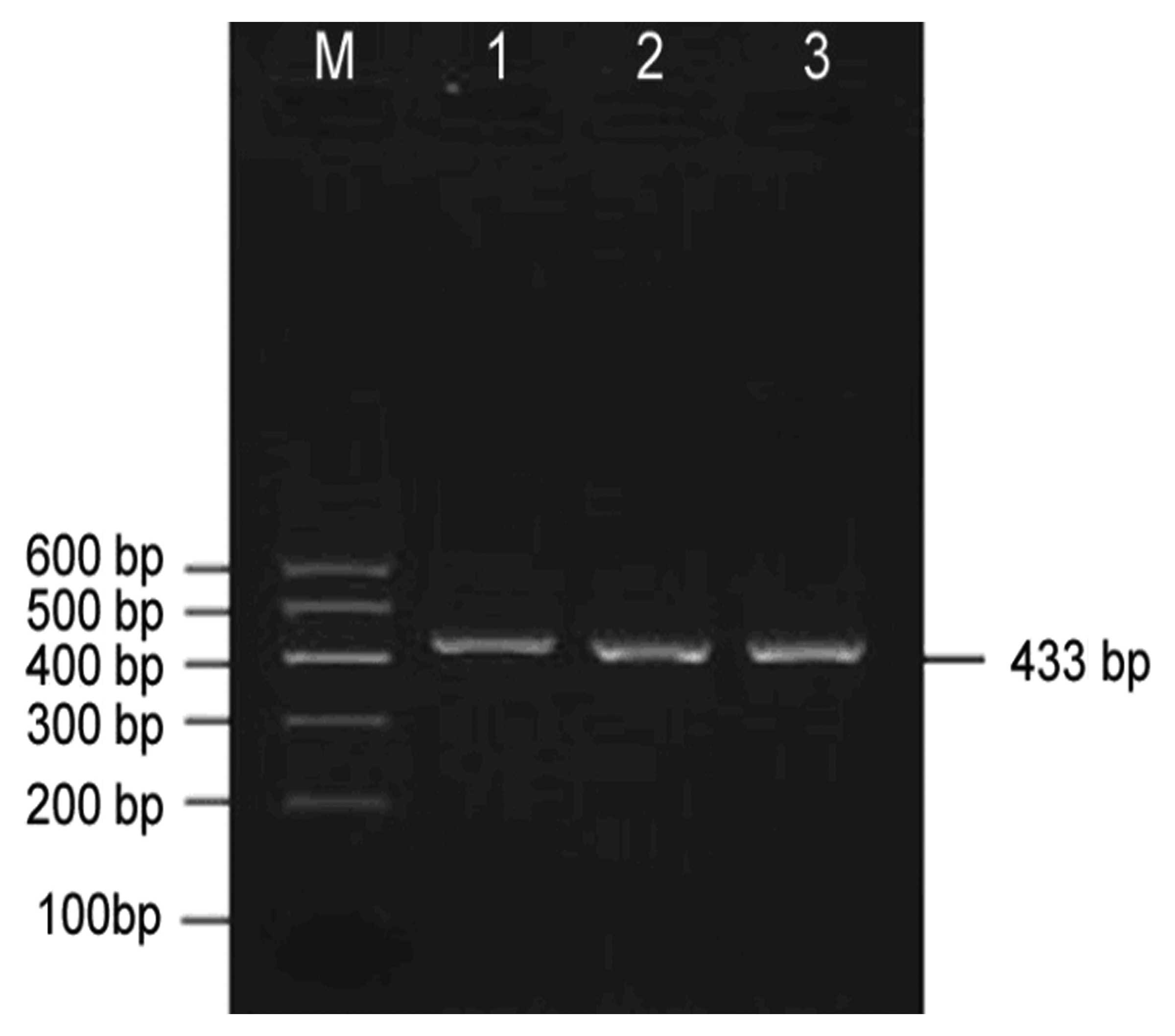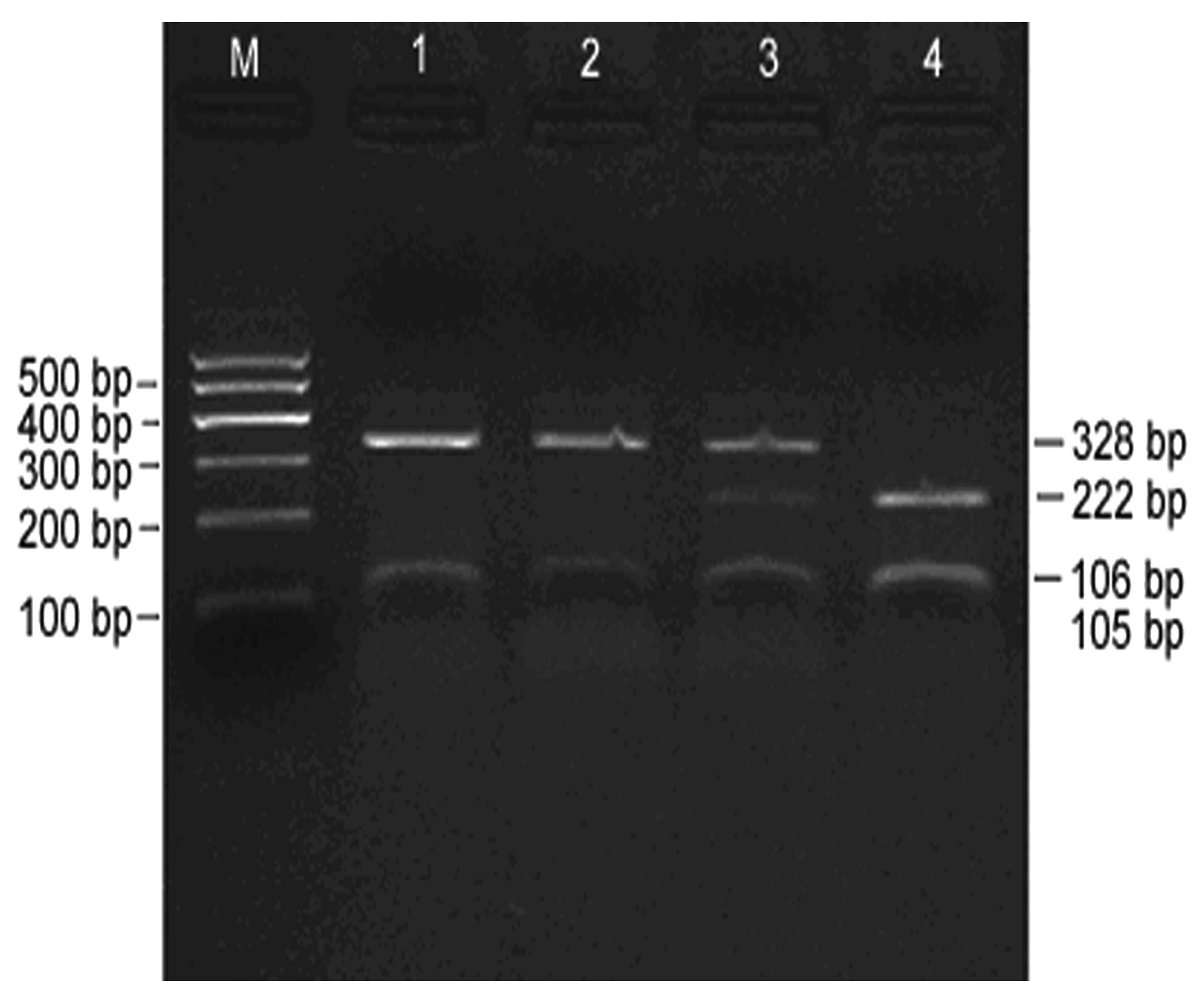|
1
|
Gu JD, Hua F, Mei CR, Zheng DJ, Wang GF
and Zhou QH: HapMap-based study on the association between MPO and
GSTP1 gene polymorphisms and lung cancer susceptibility in Chinese
Han population. Acta Pharmacol Sin. 35:636–644. 2014. View Article : Google Scholar : PubMed/NCBI
|
|
2
|
Cote ML, Chen W, Smith DW, et al: Meta-
and pooled analysis of GSTP1 polymorphism and lung cancer: a
HuGE-GSEC review. Am J Epidemiol. 169:802–814. 2009. View Article : Google Scholar : PubMed/NCBI
|
|
3
|
Ryberg D, Skaug V, Hewer A, et al:
Genotypes of glutathione transferase M1 and P1 and their
significance for lung DNA adduct levels and cancer risk.
Carcinogenesis. 18:1285–1289. 1997. View Article : Google Scholar : PubMed/NCBI
|
|
4
|
Watson MA, Stewart RK, Smith GBJ, et al:
Human glutathione S-transferase P1 polymorphisms: Relationship to
lung tissue enzyme activity and poulation frequency distribution.
Carcinogenesis. 19:275–280. 1998. View Article : Google Scholar : PubMed/NCBI
|
|
5
|
Board P, Smith S, Green J, Coggan M and
Suzuki T: Evidence against a relationship between fatty acid ethyl
ester synthase and the Pi class glutathione S-transferase in
humans. J Biol Chem. 268:15655–15658. 1993.PubMed/NCBI
|
|
6
|
Yang L, Yang X, Ji W, et al: Effects of a
functional variant c.353T≥C in snai1 on risk of two contextual
diseases. Chronic obstructive pulmonary disease and lung cancer. Am
J Respir Crit Care Med. 189:139–148. 2014.PubMed/NCBI
|
|
7
|
Fathy M, Hamed M, Youssif O, Fawzy N and
Ashour W: Association between environmental tobacco smoke exposure
and lung cancer susceptibility: modification by antioxidant enzyme
genetic polymorphisms. Mol Diagn Ther. 18:55–62. 2014. View Article : Google Scholar : PubMed/NCBI
|
|
8
|
Nishina T, Takano Y, Denda T, et al: A
phase II clinical study of mFOLFOX6 plus bevacizumab as first-line
therapy for Japanese advanced/recurrent colorectal cancer patients.
Jpn J Clin Oncol. 43:1080–1086. 2013. View Article : Google Scholar : PubMed/NCBI
|
|
9
|
Zhang CS, Tan Z, Lu L, et al: Polymorphism
of Prodynorphin promoter is associated with schizophrenia in
Chinese population. Acta Pharmacol Sin. 25:1022–1026.
2004.PubMed/NCBI
|
|
10
|
Ishii T, Teramoto S and Matsuse T: GSTP1
affects chemoresistance against camptothecin in human lung
adenocarcinoma cells. Cancer Lett. 216:89–102. 2004. View Article : Google Scholar : PubMed/NCBI
|
|
11
|
Lewis AD, Forrester LM, Hayes JD, et al:
Glutathione S-transferase isoenzymes in human tumours and tumour
derived cell lines. Br J Cancer. 60:327–331. 1989. View Article : Google Scholar : PubMed/NCBI
|
|
12
|
Wenzlaff AS, Cote ML, Bock CH, et al:
CYP1A1 and CYP1B1 polymorphisms and risk of lung cancer among never
smokers: a population-based study. Carcinogenesis. 26:2207–2212.
2005. View Article : Google Scholar : PubMed/NCBI
|
|
13
|
Buratti FM, Scardala S, Funari E and
Testai E: Human glutathione transferases catalyzing the conjugation
of the hepatoxin microcystin-LR. Chem Res Toxicol. 24:926–933.
2011. View Article : Google Scholar : PubMed/NCBI
|
|
14
|
Chan QK, Khoo US, Chan KY, et al: Promoter
methylation and differential expression of pi-class glutathione
S-transferase in endometrial carcinoma. J Mol Diagn. 7:8–16. 2005.
View Article : Google Scholar : PubMed/NCBI
|
|
15
|
Oguztüzun S, Aydin M, Demirag F, et al:
The expression of GST isoenzymes and p53 in non-small cell lung
cancer. Folia Histochem Cytobiol. 48:122–127. 2010.PubMed/NCBI
|
|
16
|
Haroun RA, Zakhary NI, Mohamed MR,
Abdelrahman AM, Kandil EI and Shalaby KA: Assessment of the
prognostic value of methylation status and expression levels of
FHIT, GSTP1 and p16 in non-small cell lung cancer in Egyptian
patients. Asian Pac J Cancer Prev. 15:4281–4287. 2014. View Article : Google Scholar : PubMed/NCBI
|
|
17
|
Kalaivani P, Saranya S, Poornima P, et al:
Biological evaluation of new nickel(II) metallates: Synthesis,
DNA/protein binding and mitochondrial mediated apoptosis in human
lung cancer cells (A549) via ROS hypergeneration and depletion of
cellular antioxidant pool. Eur J Med Chem. 82:584–599. 2014.
View Article : Google Scholar : PubMed/NCBI
|
|
18
|
Shantakumar S, Gammon MD, Eng SM, et al:
Residential environmental exposures and other characteristics
associated with detectable PAH-DNA adducts in peripheral
mononuclear cells in a population-based sample of adult females. J
Expo Anal Environ Epidemiol. 15:482–490. 2005. View Article : Google Scholar : PubMed/NCBI
|
|
19
|
Aynacioglu AS, Nacak M, Filiz A, Ekinci E
and Roots I: Protective role of glutathione S-transferase P1
(GSTP1) Val105Val genotype in patients with bronchial asthma. Br J
Clin Pharmacol. 57:213–217. 2004. View Article : Google Scholar : PubMed/NCBI
|
|
20
|
Yang Y and Xian L: The association between
the GSTP1 A313G and GSTM1 null/present polymorphisms and the
treatment response of the platinum-based chemotherapy in non-small
cell lung cancer (NSCLC) patients: a meta-analysis. Tumour Biol.
35:6791–6799. 2014. View Article : Google Scholar : PubMed/NCBI
|
















